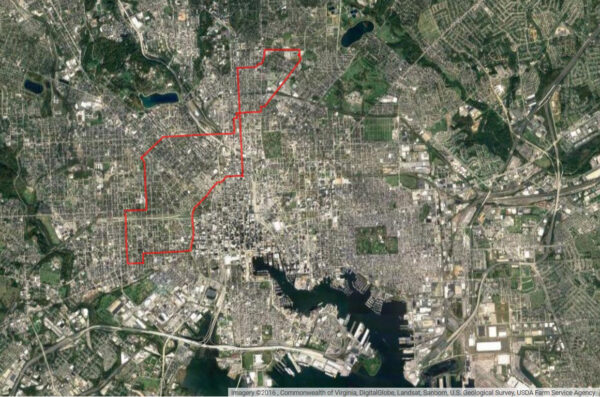ACLU Comment on Federal Court Decision on Pilot Aerial Surveillance Case in Baltimore
BALTIMORE — The American Civil Liberties Union today announced it will promptly appeal a federal court decision allowing the Baltimore Police Department (BPD) to temporarily move forward in deploying a wide-area aerial surveillance pilot program that would put virtually all Baltimore residents under constant, aerial surveillance. The court’s ruling is not a final judgment deciding the case. Plaintiffs plan to appeal the ruling to the U.S. Court of Appeals for Fourth Circuit.
The American Civil Liberties Union (ACLU) and ACLU of Maryland filed suit against the BPD earlier this month on behalf of plaintiffs Leaders of a Beautiful Struggle, a grassroots think-tank that advances the public policy interests of Black people in Baltimore, Erricka Bridgeford, co-founder of the Baltimore Ceasefire 365 project, and Kevin James, a community organizer and hip-hop musician. In response, the Baltimore Police Department agreed to postpone the deployment of its aerial surveillance system until the district court had an opportunity to hear arguments from both parties concerning the plaintiffs’ request to temporarily halt the program.
The BPD contracted with a private company, Persistent Surveillance Systems (PSS), to pilot this “Aerial Investigation Research” program. PSS’s high-resolution, camera-equipped planes will fly over the entire city of Baltimore at least 40 hours a week, creating a slow-frame-rate video record of anyone’s outdoor movements and allowing police to retroactively track a person’s movements from any place. The BPD the program’s intended purpose is to aid criminal investigations, however, government officials have a history of secretly using similar technology for other purposes — including aerial surveillance of Black Lives Matter protests in Baltimore in recent years.
The ACLU argued this surveillance system presents a threat to our individual right to privacy and free association under the Fourth and First Amendments, respectively. Today, the court ruled the BPD could legally move forward with deploying its aerial surveillance program.
Below are comments from:
Ashley Gorski, senior staff attorney in the ACLU’s National Security Project: “This technology could become a chilling and all-seeing part of daily life all over the country. It presents a society-changing threat to everyone’s rights to privacy and free association. We believe a program like this should never get off the ground, and we plan to appeal as quickly as possible to ensure that is the case.”
David Rocah, senior staff attorney at the ACLU of Maryland: “It is tragic and unacceptable that the failures of the Baltimore Police Department, and the city’s long-term unwillingness to address the root causes of crime, have now led to the decision to impose the most far-reaching mass surveillance program in American history here in Baltimore. If allowed to stand, this ruling is a decision that the city, and the country, will come to regret. Baltimore is a city with a terrible history of racism and lack of accountability for abuses by police, which only further compounds our concerns about this program’s potential for misuse. We are hopeful that the courts will eventually recognize the serious constitutional issues here and stop the persistent aerial surveillance program.”
Plaintiff Erricka Bridgeford, co-founder of the Baltimore Ceasefire 365 project, which aims to reduce gun violence through ceasefires and peace challenges: "While I'm disappointed about this ruling, doing my part to help protect the rights of Baltimoreans is my focus. I've lost my brother to violence, and there are proven ways to help families not go through what my family endures. This surveillance program is not one of them. I'm in this fight for families like mine, who've lost loved ones, and want healthy, effective ways to stop violence in Baltimore."
Plaintiff Dayvon Love, director of public policy with Leaders of a Beautiful Struggle: “The opinion is extremely disappointing. This kind of technology should not be in the hands of any police department, especially one with a history of pervasive corruption. This technology will compound the harms inflicted on residents who have been impacted by well-documented police abuses in Baltimore.”
Plaintiff Kevin James, a community organizer and hip-hop musician known as Son of Nun: “The judge’s decision is really disappointing because surveilling all of Baltimore should not be the focus right now. Going ahead with this invasive and potentially harmful technology is not in the best interest of our community.”
